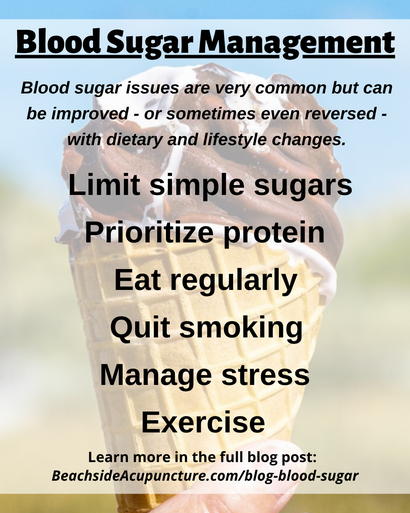
This post contains affiliate links, meaning Beachside Community Acupuncture PLLC may receive a small commission for purchases made through certain links at no additional cost to you. (In other words, you support us in a small way when you buy the products that we highly recommend and would use ourselves!) Click here to view our full disclosure policy.
The number of people with blood sugar issues has increased over the years, and we see plenty of patients whose doctors warn them about their blood sugar, even if they do not yet have an official diagnosis of diabetes or pre-diabetes. Blood sugar regulation is heavily influenced by diet and lifestyle, but sometimes the recommendations given by health professionals can seem overwhelming or incomplete. Use this post to gain a basic understanding of blood sugar and use that information to comprehend why adjustments to eating and day-to-day activities can help with its balance.
What Is Blood Sugar?
The body more or less runs on glucose, and "blood glucose" is the more proper way of saying blood sugar. Every cell in every tissue in every organ uses glucose for energy, so the molecule is in no way "bad for you" as one might expect.
After you consume a meal, the food gets broken down into smaller and smaller pieces, one of which is glucose, and those pieces circulate to the various cells through the bloodstream. The blood glucose should either get taken up cells to provide them with energy, or it should be stored for later use. It becomes an issue when it hangs out in the blood longer than it should, such as when the cells do not respond to the insulin that mediates its entrance into them. Consistently high blood sugar can lead to issues with the kidneys, the liver, the nervous system, vision, wound healing, and more.
Lab tests are the standard for diagnosing blood sugar imbalances, and doctors usually look at two in particular:
- Fasting glucose is how much glucose remains in your bloodstream hours after you've eaten. Ideally it would be below 100 mg/dL, indicating that your body utilizes the glucose that spikes after a meal and resets to a normal baseline.
- Hemoglobin A1c (HbA1c) is a measure of how the body has managed glucose over the past two to three months. Hemoglobin is a component of red blood cells, and glucose attaches to it when there are high levels of it in the blood. HbA1c should be below 5.7%.
Dietary Changes to Control Blood sugar
We need glucose to survive, but the way in which glucose is introduced makes a very big difference in how the body handles it. Blood sugar issues are often associated with the roller coaster of spikes and crashes that happen with simple sugars and poor eating choices. Luckily, these can be avoided with healthy habits...
- Limit simple sugars: Sweets, sodas, and juices cause a quick spike in blood sugar as their breakdown does not take very long. "White" carbohydrates (like white bread and pasta that isn't whole wheat) and alcohol can also cause this same surge. Prioritize complex carbohydrates that take longer to break down and therefore lead to a more gradual increase in blood sugar. If you really want something sweet, choose a natural sweetener that doesn't influence blood sugar, like monk fruit or stevia.
- Pair carbohydrates with protein (and "good" fat): Consuming a balance of the three macronutrients also decreases the rate at which glucose becomes available in the blood. Complete meals lead to a feeling of satiety, meaning there won't be a sudden crash or a need to grab a sugary pick-me-up after the meal has digested.
- Eat regularly: Blood sugar can also drop too low, which usually prompts people to grab a sugary snack for a quick boost. Regular, whole-food meals maintain consistency, and having dinner at least a couple hours before bed gives the body adequate time to start digestion.
- Be mindful of fruit: Different fruits have different health benefits, but the fructose found in all of them is a simple sugar. Combining fruit with protein and fat, like having an apple with peanut butter or berries with Greek yogurt, offsets the blood sugar spike that would happen after eating a piece of fruit on its own.
Lifestyle Changes to Control Blood Sugar
Nutrition should be the first intervention in blood sugar management, but lifestyle factors are important as well. Make sustainable changes to diet a priority, and then follow them with lifestyle adjustments to further balance the body.
- Exercise: Activity causes muscles to uptake more glucose from the bloodstream so that less is in circulation. Exercise also has a host of other health benefits - like better sleep and decreased stress - which also aid in blood sugar regulation.
- Stress Management: The stress hormone cortisol has an inverse relationship with insulin, and when the body is in the "fight or flight" state during stress, it deprioritizes digestion, wanting more glucose in the bloodstream to be used by the muscles to defend itself or flee. Yoga, meditation, and other hobbies can break up the stresses of daily life, as can modalities like acupuncture and massage.
- Smoking cessation: Smoking is known for its ties to cancer and lung diseases, but it also increases the risk of developing type 2 diabetes by 30% to 40%.
- Supplements: Only to be used in conjunction with diet (not in place of it), supplementing with herbs and vitamins may help blood sugar as well. Common choices are cinnamon, gymnema, bitter melon, berberine, and myo-inositol. *Always talk to your doctor before starting something new.

Many doctors will give patients time to make changes like the ones suggested here, recommending new labs three to six months later to see how they're progressing. Medications are an option that your doctor may discuss with you if your blood sugar remains high even after substantial diet and lifestyle adjustments. As with any medical intervention - holistic or allopathic - weigh the risks and benefits, keeping in mind that elevated blood sugar can lead to organ damage and other serious conditions if left unchecked.

Kathleen Ketola is a Licensed Acupuncturist and the owner of Beachside Community Acupuncture. She loves providing affordable acupuncture to the residents of McKinney, Texas, and surrounding cities like Prosper, Frisco, and Melissa, but she also enjoys educating the general public on how acupuncture and Traditional Chinese Medicine (TCM) can treat everything from pain to infertility to stress and beyond. Click "Book Now" at the top of this page to book an appointment or feel free to contact her at (214) 417-2260.








